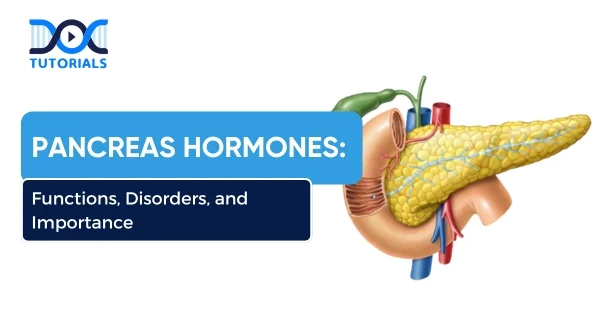Pancreas Hormones: Functions, Disorders, and Importance

The pancreas is a tadpole-like shaped gland situated deep within the abdominal cavity and is necessary for digestion and blood sugar control. It produces important pancreatic hormones like insulin and glucagon, meant for balancing glucose levels, and enzymes that digest food.
Malfunctioning of this organ can lead to threatening diseases such as diabetes or pancreatitis. Understanding the hormones secreted by the pancreas helps one grasp how the body manages energy and metabolic health.
This guide is a must-read for NEET PG aspirants aiming to master pancreatic functions and disorders for both exams and clinical knowledge. Keep reading for a detailed insight into pancreas hormones.
What are Pancreas Hormones?
The pancreas is a gland, located at the back of your abdomen and with an important role in both the digestive and endocrine systems. As a result, the functions of the pancreas include the production of enzymes and hormones, which support the proper working of the body.
The exocrine part of the pancreas discharges the enzymes that assist the body in the digestion of fats, proteins, and carbohydrates. Meanwhile, the endocrine part of the pancreas manufactures vital hormones like insulin and glucagon that control the blood sugar in your body.
What are the Functions and Importance of Pancreatic Hormones?
The pancreas plays a critical role in maintaining overall health by aiding digestion and regulating blood sugar levels. This dual-function gland not only supports the digestive system but also helps vital organs like the heart, liver, kidneys, and brain function efficiently.
The pancreas is responsible for the overall health of a human by breaking down food and controlling the sugar levels in the blood. Below are the functions of the pancreas:
- Aids in Digestion
The exocrine part of the pancreas secretes 1-4 litres of enzyme-rich juice per day, depending on the amount of food eaten. These enzymes flow through the small ducts into the main pancreatic duct, which is connected to the bile duct. Subsequently, bile from the liver and pancreatic juice enter the duodenum to break down fat, protein, and carbohydrates for absorption purposes.
- Produces Essential Hormones
The endocrine part of the pancreas serves the important function of secreting hormones like insulin and glucagon, which are used to control blood sugar levels. Thus, insulin acts to reduce high levels of blood sugar, while glucagon takes action when levels drop.
What are the Common Disorders Associated with the Pancreas Hormones?
The pancreas can get several disorders that can affect its ability to digest and regulate blood sugar. These range from mild imbalances to life-threatening diseases and need to be addressed on time. They include:
- Type 1 Diabetes: This is the kind that occurs when the pancreas fails to produce insulin. Without insulin, the body cannot control blood sugar levels.
- Type 2 Diabetes: This is a condition where the pancreas does produce insulin, but the body is not able to use it properly, hence elevating blood sugar levels over a longer period of time.
- Hyperglycaemia (High Blood Sugar): Excess sugar release occurs when the body produces an excess of glucagon, which leads to hyperglycemia.
- Hypoglycaemia (Low Blood Sugar): It forms when the pancreas releases an excessive amount of insulin, leading to dangerously low blood pressure levels.
- Pancreatitis: This takes place when pancreatic enzymes get activated too early, setting up inflammation. Pancreatitis can either be acute or chronic, with gallstones or alcohol use as catalysing agents.
- Pancreatic Cancer: It is a state where cancer cells infiltrate the pancreas, for which early detection is usually difficult.
Other Pancreatic Disorders
- Exocrine pancreatic insufficiency: The pancreas fails to produce adequate digestive enzymes, thereby precipitating malabsorption, weight loss, and diarrhoea.
- Pancreatic cysts and fluid collections: These are the main causes of abdominal pain and infection.
- Zollinger-Ellison syndrome: Tumours occurring in the pancreas or duodenum cause excess production of stomach acid.
How Can Pancreatic Problems Be Prevented?
Prevention of pancreatic disorders pertains to living a healthy life and taking care of risk factors at their onset. Such measures effectively reduce the chances of contracting pancreatitis, diabetes, or pancreatic cancer.
- Maintain a Healthy Weight: Regular exercise, along with a healthy weight, will reduce Type 2 diabetes and gallstones, both of which may affect the pancreas.
- Eat a Low-Fat Diet: Fatty foods contribute to facilitating gallstone formation, which can lead to pancreatitis. Also, obesity is associated with pancreatic cancer.
- Limit Alcohol Consumption: The less alcohol, the lower the risk for pancreatitis and pancreatic cancer.
- Avoid Tobacco Use: The use of tobacco, including smoking, drastically increases the risk of chronic pancreatitis and pancreatic cancer.
- Get Regular Health Checkups: Regular medical checkups create an opportunity to detect early signs of pancreatic dysfunctions and take steps towards intervention.
FAQs About Pancreas Hormones
1. Can you live without a pancreas?
Yes, it is possible, but it has to be replaced with enzyme supplements that allow digestion, and insulin will be injected for the rest of life to regulate blood sugar levels. Removal of the whole pancreas would be very rarely performed, such as for pancreatic cancer, severe injury to the gland, or chronic pancreatitis.
2. What are the functions of the pancreas and its common disorders?
The pancreas secretes digestive juices to digest food and hormones such as insulin to regulate blood sugar. Its common disorders are pancreatitis (inflammation of the pancreas), diabetes, and pancreatic cancer.
3. What are the parts of the pancreas?
The pancreas is a six-inch-long gland located deep within the abdomen behind the stomach. The parts include: head, neck, body, tail, and uncinate process.
4. What are the three main hormones produced by the pancreas?
The pancreas produces two competing hormones, insulin and glucagon, that balance blood sugar levels. It also produces somatostatin and pancreatic polypeptide, which help to regulate other pancreatic functions.
Conclusion
The pancreas, being a vital organ, balances digestion and blood sugar levels through its enzymes and hormones. When pancreatic hormones get disturbed, serious medical conditions can follow, such as diabetes and pancreatitis. Keeping the pancreas healthy would mean taking care of a healthy lifestyle, not smoking or drinking too much, eating a balanced diet, and so on.
If you are a medical student, DocTutorials offers a huge variety of such topics, along with quality video lectures, question banks, test series, and expert guidance for that extra boost toward soaring success in your examinations. Join DocTutorials today and explore our NEET PG course to excel in your medical career.
Latest Blogs
-

NEET PG Exam 2025- Date, Pattern, Marking Scheme, Subject Wise Weightage, and Exam Mode
NEET PG Exam 2025 is the ultimate gateway for medical graduates aspiring to pursue postgraduate courses in medicine, including MD,…
-

INI CET Exam 2025: Your Roadmap to Success – Key Topics, Strategies, and Lessons from Last Year’s Papers
The INI CET exam is more than just a test; it’s a significant milestone for many medical students aiming to…
-

INI CET Exam Success: Previous Year Question Papers & Ultimate Guide – INI CET PYQ
One can feel overwhelmed while preparing for the INI CET (Institute of National Importance Combined Entrance Test). A vast syllabus,…




